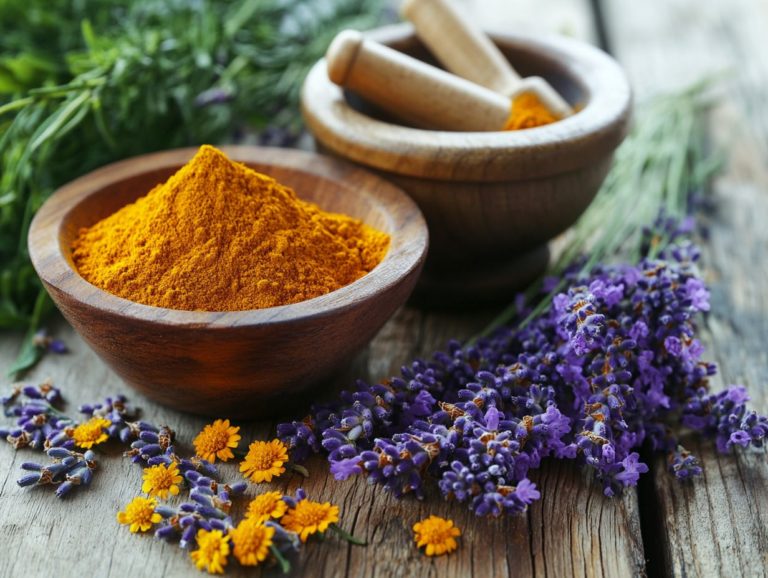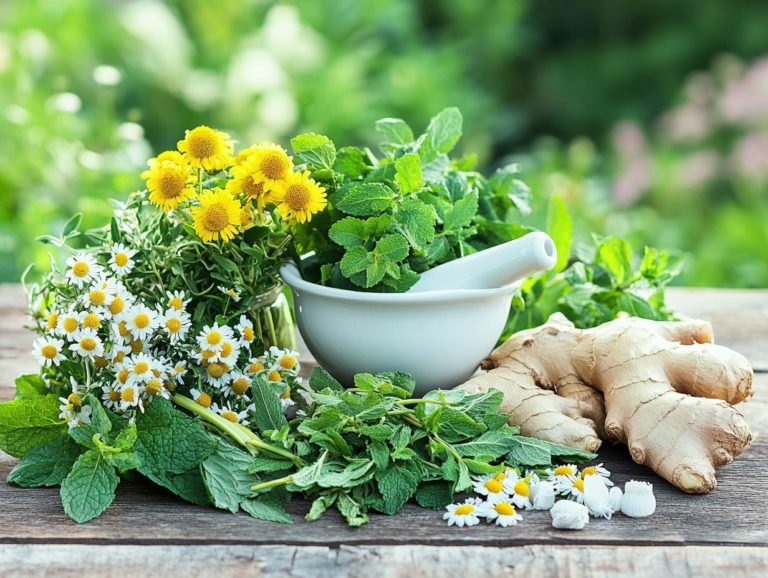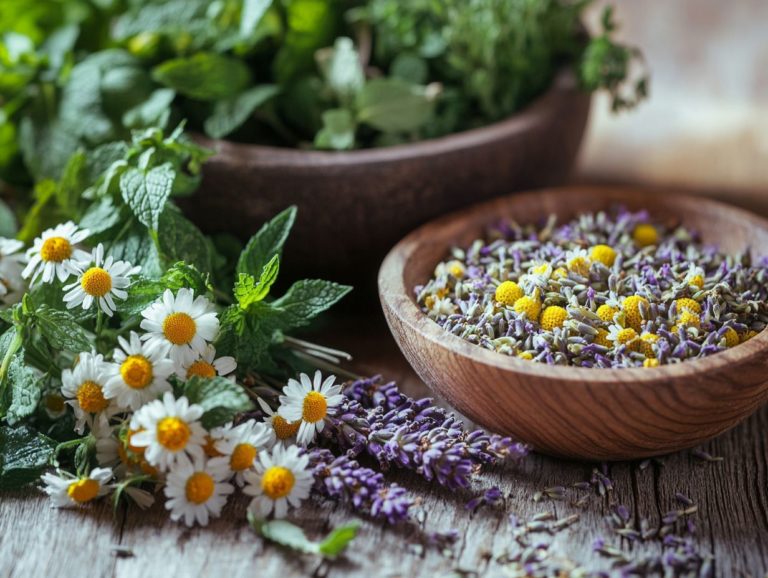Natural Herbal Remedies for Allergies
Contents
- Key Takeaways:
- Understanding Allergies
- Natural Herbal Remedies for Allergies
- Alternative Treatments for Allergies
- Lifestyle Changes for Allergy Prevention
- Frequently Asked Questions
- What are natural herbal remedies for allergies?
- How do natural herbal remedies for allergies work?
- What are some common natural herbal remedies for allergies?
- Are there any side effects of using natural herbal remedies for allergies?
- Can natural herbal remedies for allergies replace traditional medication?
- Are natural herbal remedies for allergies safe for everyone?
Key Takeaways:
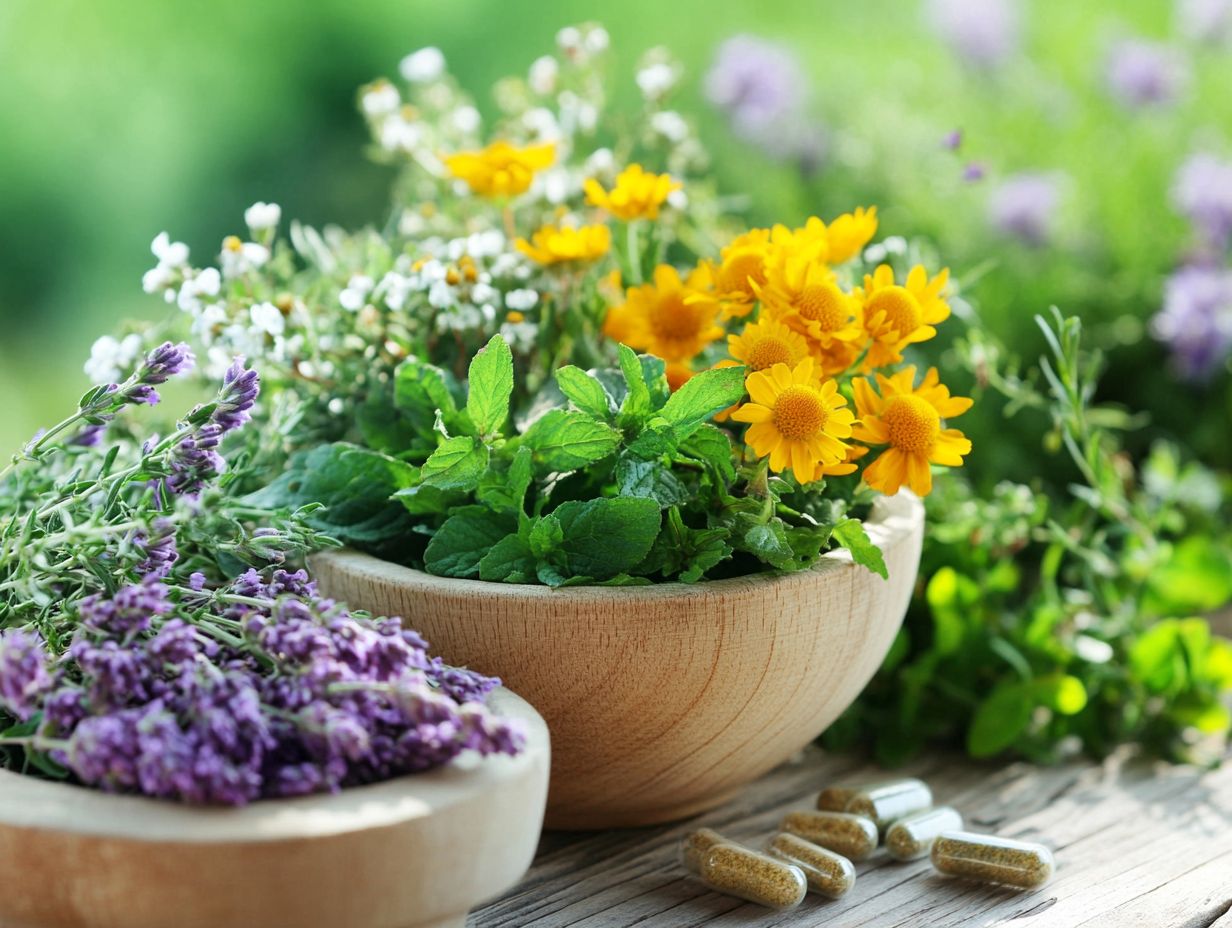
- Natural herbal remedies can provide effective relief for allergies.
- Herbs and plants such as ginger, nettle, and butterbur can help alleviate allergy symptoms.
- You can also make lifestyle changes like dietary modifications and environmental adjustments to prevent and manage allergies.
Understanding Allergies
Understanding allergies, especially allergic rhinitis (a condition that makes your nose stuffy and your eyes itchy), is essential. Allergies impact millions around the globe, causing symptoms like nasal congestion and itchy eyes.
Seasonal allergies can be triggered by various allergens, including pollen, dust, and pet dander. Many pursue relief through both conventional medicine and holistic approaches.
Understanding how your body reacts to allergens can help you manage allergies better.
What are Allergies?
Allergies arise when your immune system overreacts to substances known as allergens. This can lead to conditions like allergic rhinitis, leaving you grappling with symptoms such as nasal congestion and itchy eyes.
This hypersensitivity can manifest in various ways, including food allergies, reactions to pollen, or sensitivities to pet dander. For many, the physical impacts can be debilitating think respiratory distress, skin irritations, and frequent headaches. The relentless nature of these symptoms can also lead to anxiety, frustration, and social withdrawal as you navigate environments to avoid triggers.
Common symptoms like sneezing, a runny nose, and hives significantly diminish your quality of life. Therefore, it’s crucial to understand the broader implications of allergies on both your physical and mental well-being.
By addressing the root causes within your immune system, you can embark on a path toward effective management and find relief from these distressing conditions.
Common Allergens
Common allergens like pollen from trees and grasses, dust mites, and pet dander are significant triggers for those who experience seasonal allergies.
These allergens originate from various sources, with pollen often peaking during specific seasons spring for tree pollen and late summer for ragweed. Dust mites, those microscopic nuisances lurking in household dust, thrive in humid environments, making their unwelcome presence felt year-round, especially for individuals with asthma. Pet dander, consisting of tiny flakes from your furry friend’s skin, can intensify symptoms for those who share their homes with animals.
Those at greater risk include children, the elderly, and individuals with pre-existing respiratory conditions. Exposure to these allergens can provoke a range of physiological responses ranging from sneezing and a runny nose to more serious issues like asthma attacks, which can disrupt daily activities and diminish overall quality of life.
Natural Herbal Remedies for Allergies
Natural herbal remedies have become increasingly popular for their potential to alleviate allergy symptoms, offering effective options to minimize allergic reactions.
Ingredients like Butterbur, Stinging Nettle, Echinacea, and Quercetin (a natural compound found in many fruits and vegetables) are particularly noteworthy. They are celebrated for their antihistamine properties and immune-boosting effects.
These natural alternatives present a compelling choice for anyone looking to explore holistic treatment options beyond conventional medicine.
Explore these remedies today and take control of your allergies!
Herbs and Plants for Allergy Relief
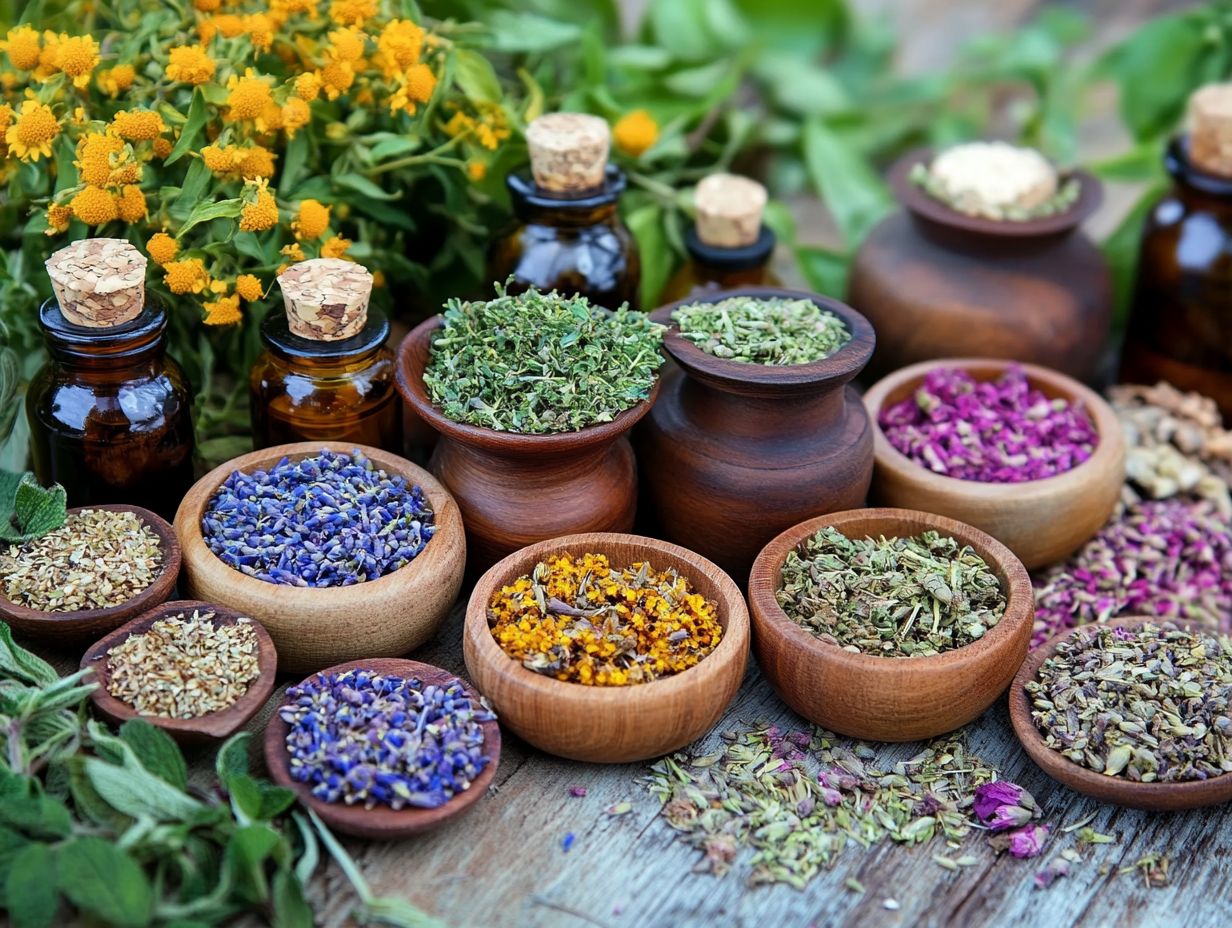
Several herbs and plants, like Butterbur and Stinging Nettle, are known to work wonders for allergy relief! Their natural antihistamine properties make them effective choices.
These botanical treasures have been used for centuries. Recent studies are beginning to substantiate their effectiveness in managing pesky allergy symptoms like sneezing, itching, and congestion.
For example, Butterbur has shown encouraging results in clinical trials. It demonstrates the ability to block histamine release, which could significantly alleviate hay fever symptoms.
Stinging Nettle also acts as a natural antihistamine by inhibiting the body’s production of histamine. Echinacea may boost the immune system, aiding in the fight against allergic reactions.
Quercetin, a flavonoid found in various fruits and vegetables, has also garnered attention. It has the potential to stabilize mast cells, which are cells that help trigger allergic reactions, and prevent the release of histamine.
This makes these plants not only advantageous but also scientifically validated options for anyone seeking alternative relief from allergies.
How to Use Herbs for Allergy Relief
Using herbs for allergy relief can be a rewarding journey. You have various methods at your disposal teas, capsules, or tinctures.
Each approach deserves your careful consideration regarding dosage and effectiveness. To truly harness the benefits of these natural remedies, start by researching specific herbs known for their antihistamine properties, such as Stinging Nettle or Butterbur.
It s wise to consult with a healthcare professional before starting any new regimen. This is especially important if you’re taking other medications, as interactions can occur unexpectedly.
For instance, when you brew a tea, steeping dried herbs in hot water for 10 to 15 minutes can yield a powerful infusion. Tinctures often provide concentrated doses that vary between brands.
Keep an eye out for potential side effects like gastrointestinal discomfort or allergic reactions to ensure that your approach to allergy relief is both safe and effective.
Alternative Treatments for Allergies
Alternative treatments for allergies include a range of holistic approaches, such as acupuncture and homeopathy. These methods focus on addressing the underlying causes of your allergies rather than simply masking the symptoms.
Acupuncture and Acupressure
Acupuncture and acupressure are alternative therapies that stimulate specific points on your body. Their aim is to promote healing and alleviate pesky allergy symptoms.
Rooted in centuries-old traditions, these practices draw from the principles of Traditional Chinese Medicine. Here, the flow of energy, or ‘qi’, is believed to play a significant role in overall health.
By targeting the meridians linked to respiratory functions, you may discover relief from seasonal allergies, such as nasal congestion and sneezing.
Scientific studies suggest that acupuncture can decrease histamine release while enhancing your immune function. This potentially minimizes allergic reactions.
On the other hand, acupressure, which requires no needles, utilizes firm pressure on critical points. This offers a gentle yet effective option for anyone looking to manage allergies naturally.
Homeopathy
Homeopathy employs highly diluted natural substances to activate your body s self-healing response. It has emerged as a compelling holistic treatment for allergies.
This approach addresses the underlying imbalances within you rather than just masking symptoms. Common remedies like Histaminum, Allium cepa, and Sabadilla are often suggested for allergy sufferers.
Each remedy is tailored to combat specific symptoms such as sneezing, a runny nose, or itchy eyes. Many advocates believe these natural solutions not only ease discomfort but also uplift your overall well-being.
The effectiveness of homeopathy for allergies can differ from person to person. It demonstrates its potential where conventional treatments may stumble and showcases the power of a balanced, natural method for managing your health, such as DIY herbal remedies for common cold relief.
Lifestyle Changes for Allergy Prevention
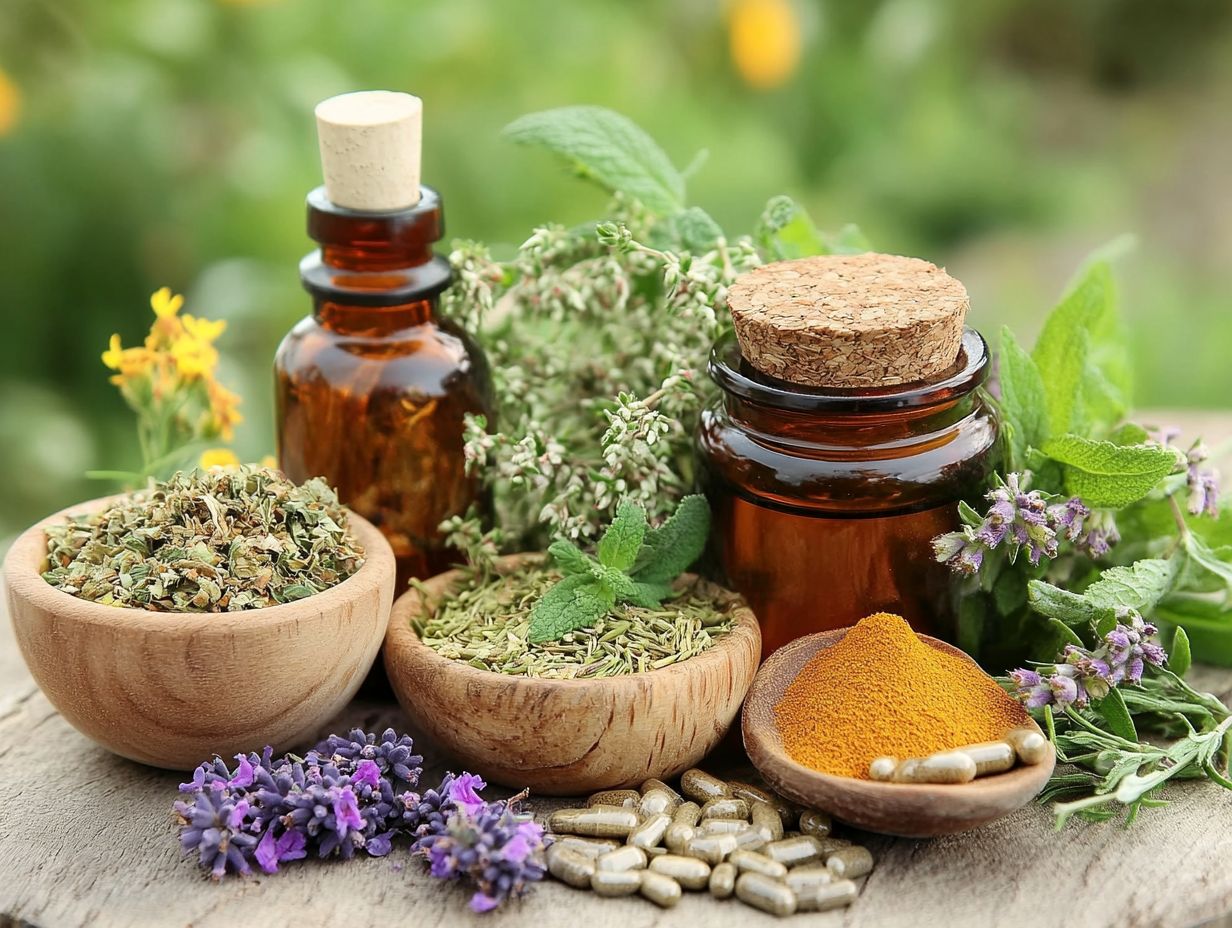
Lifestyle changes can greatly impact allergy prevention. By adopting specific practices, you can fortify your immune system and minimize your exposure to allergens.
Dietary Changes
Incorporating dietary changes can serve as powerful immune boosters to help you combat allergies. Focus on increasing your intake of vitamin C, vitamin D, and healthy fats found in fish and nuts.
Boost your vitamin C levels today by adding vibrant citrus fruits like oranges and grapefruits to your diet! This nutrient is known for enhancing immune response and reducing the severity of allergic reactions.
Indulge in fatty fish like salmon or enjoy a handful of walnuts to gain essential healthy fats. These fats boast anti-inflammatory properties that can ease allergic symptoms.
Don t forget about vitamin D! Incorporating foods rich in this nutrient, such as fortified dairy products and egg yolks, may further strengthen your overall immune function. By making these mindful adjustments, you not only fortify your immune system but also potentially lessen the frequency and intensity of allergic responses.
Environmental Modifications
Enhancing indoor air quality and minimizing allergens are essential steps in effectively managing allergies.
Investing in high-efficiency air purifiers can significantly reduce airborne particles, creating a cleaner atmosphere in your home. Regular cleaning practices, like vacuuming with HEPA filters and dusting surfaces, are vital for eliminating dust mites and mold two common triggers that can wreak havoc on your health.
Adopting a no-shoe policy indoors helps limit the introduction of outdoor allergens, providing a safer haven for you and your family.
If pet allergies are a concern, keeping pets off furniture and grooming them regularly can lead to a noticeable improvement in your environment. Choosing eco-friendly cleaning solutions is beneficial for your health and the planet. These preventive measures benefit both allergy sufferers and the environment, making them a win-win for everyone involved.
Frequently Asked Questions
What are natural herbal remedies for allergies?
Natural herbal remedies for allergies are plant-based solutions that can help alleviate symptoms such as sneezing, runny nose, and itchy eyes. These remedies are made from herbs and plants that have been used for centuries for their medicinal properties.
How do natural herbal remedies for allergies work?
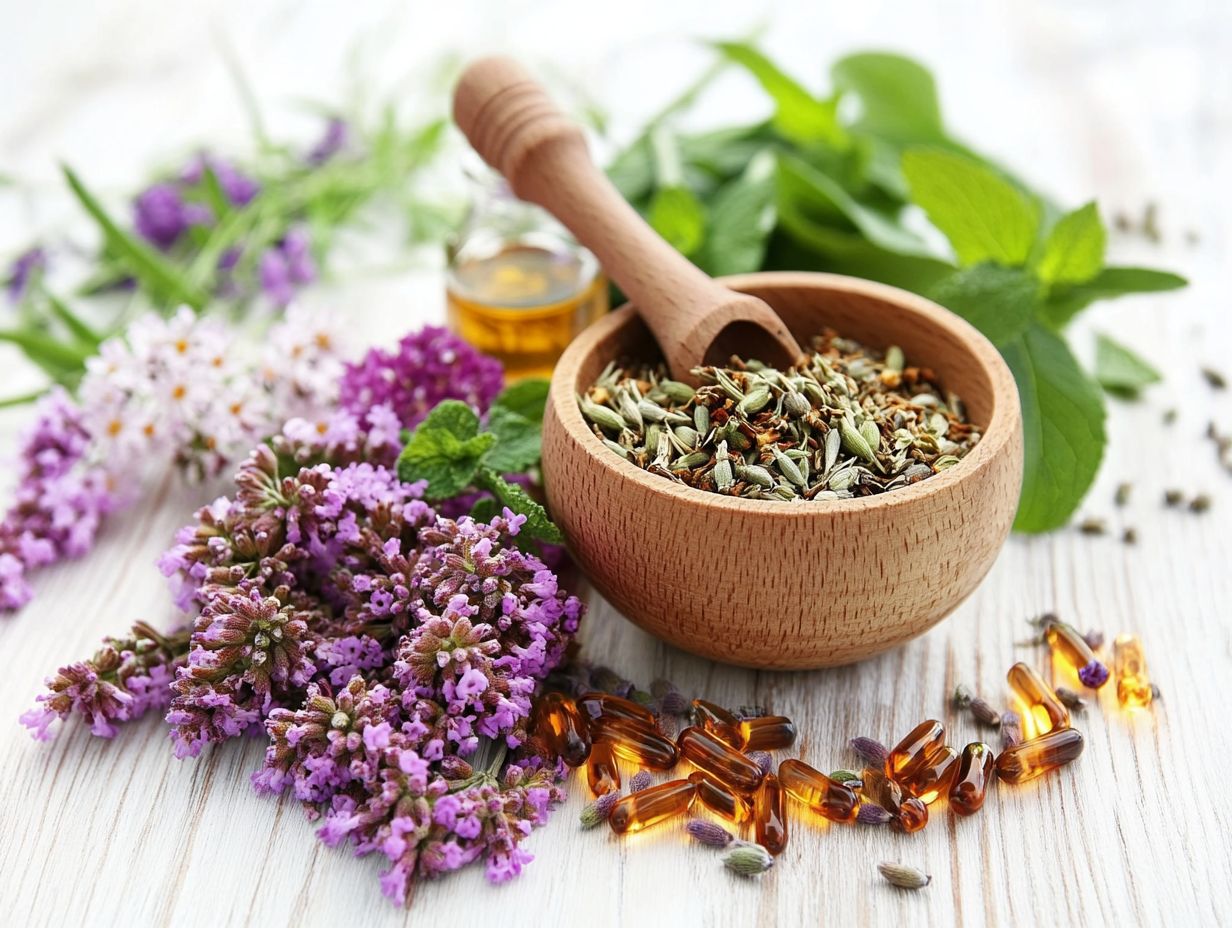
Natural herbal remedies work by reducing the body’s immune response to allergens. They contain compounds with anti-inflammatory and antihistamine properties, which can help relieve symptoms associated with allergies. Antihistamines are substances that help reduce allergy symptoms by blocking histamine, a chemical in the body that causes allergic reactions.
What are some common natural herbal remedies for allergies?
Some common natural herbal remedies include butterbur, stinging nettle, ginger, peppermint, and chamomile. These herbs are known for their anti-inflammatory and antihistamine properties that can help reduce allergy symptoms.
Are there any side effects of using natural herbal remedies for allergies?
While natural herbal remedies are generally safe, some people may experience side effects such as upset stomach, drowsiness, or allergic reactions. It is important to consult with a healthcare professional before using any herbal remedies, especially if you have underlying health conditions or are taking medication.
Can natural herbal remedies for allergies replace traditional medication?
It is not recommended to rely solely on natural herbal remedies for allergies. While these remedies can help alleviate symptoms, they may not provide the same level of relief as traditional medication. Always consult with a healthcare professional for proper treatment and management of allergies.
Consider making these lifestyle changes today! Consult with healthcare professionals for personalized advice on managing your allergies.
Are natural herbal remedies for allergies safe for everyone?
Natural herbal remedies for allergies may not be safe for everyone. Pregnant or breastfeeding women, children, and people with specific medical conditions, such as asthma or diabetes, should be cautious.
Always consult a healthcare professional before trying herbal remedies. This step ensures that the remedies are safe for you.



